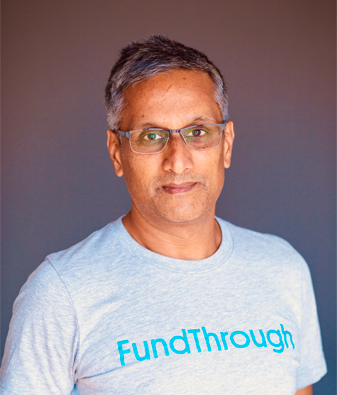Deepak Ramachandran, cofounder and CTO of FundThrough has deep ties to the University of Toronto. Ramachandran, who earned his bachelor of arts in 1991 as a member of Victoria College, recently joined a panel discussion of entrepreneurs hosted by the Munk School of Global Affairs & Policy and moderated by Shiri Breznitz, professor and director of research.
Ramachandran, who sits on the Dean's Advisory Council with Faculty of Arts & Science Dean Melanie Woodin, expands on the challenges of scaling a company up and how he maintains a talent pipeline to his alma mater.

Tell me about FundThrough and the inspiration behind the company.
Our mission is to help small businesses who issue invoices to large businesses. It’s called factoring, when you purchase an invoice from a small business and then wait to get paid. If a large buyer decides to make a payment 15 days late, that's payroll for the small supplier. It’s not uncommon. We wanted to level the playing field.
The inspiration for the business came when my business partner Steven Uster was coming back to Canada after a stint in investment banking in the U.S. He had the idea to buy a business. Many kept saying the same thing — ‘My business looks worse than it is. All I need is a little capital.’
I have more of a technology background, and at that time in 2014, technology was not a significant force in this space. Some companies were still using fax machines. A lot of small businesses are now shifting their accounting to the cloud, and we’re there with them.
You recently spoke at a Munk School of Global Affairs & Public Policy about procurement and scaling up companies alongside Derek Newton, U of T’s assistant vice-president, innovation, partnerships and entrepreneurship, and Aman Thind of Conavi Medical. What ideas did you share with the audience?
We’re a company scaling up, rather than a startup. Our challenges are different, and not as easy to address as pure startups.
We talked about the idea of procurement being helpful for startups, less so for scale-ups. For example, if the government is a large buyer and a startup’s offering a new solution to buy, supporting that as a customer is helpful. Those early customers are critical to a startup, but once you're up and running and you've got 10 or 100 customers, one extra client is not necessarily a big driver for your success anymore.
As a scale-up, FundThrough’s main need is talent. The thing we love about U of T is that in Toronto's innovation economy, the university is a talent factory. U of T has a strong innovation mindset that we appreciate — that means we receive good students.
That said, as we scale up, certain problems are more experiential than theoretical. The kind of talent we need to take our company from $20 million to $200 million means having to recruit more U.S. talent. There aren't a ton of Canadian companies in our space that have done that.
You graduated as a member of Victoria College with a degree in philosophy and chemistry. What drew you to those fields of study?
Intellectual curiosity. I loved the Department of Philosophy. It was very vibrant and engaging, with people interested in bigger questions and the spirit of learning. U of T is one of those places where you’re expected to learn beside your teachers in the spirit of open conversation.
I was also intellectually curious about organic chemistry. I had an interesting professor who was teaching an obsolete but fascinating form of chemical decomposition. I loved that course; it was a kind of puzzle-solving.
What is the importance of internships and mentoring, and how does your company stay connected to the U of T community through these types of programs?
We have developed a strong culture at FundThrough. A large part of what we care about is personal growth for our employees. My business partner and I are both personal development people and we focus on that as a value. Mentorship plays a big role in my management style.
We've always taken pride in bringing in young people, helping them grow and giving them new opportunities. In that spirit, we’d had quite a few U of T alumni and students work for us as interns and co-op students, some of whom have stayed with us full time and others have gone on to do great things.
The very best students at U of T don't have any trouble getting placed into the next thing they want to do, whether it's academic, working for a startup or for an established company. It’s a talent pipeline.
What does the U of T community still mean to you?
U of T is an anchor tenant in our ecosystem. For me, it kicked me off in the right direction. I appreciate the energy being brought by Melanie Woodin. It’s great working with her and the Faculty of Arts & Science and I’m thrilled to be part of that.

